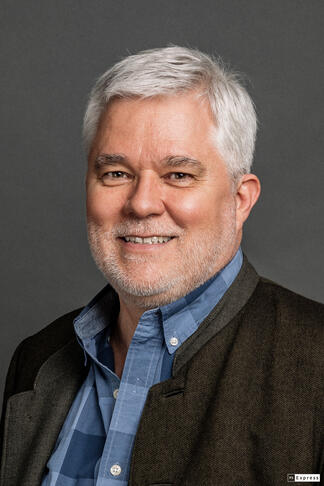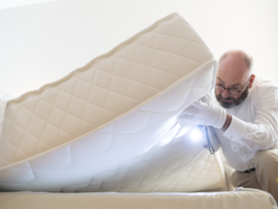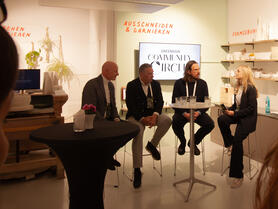
News
Hotel industry can avoid up to ten million tons of CO2 annually and reduce costs at the same time
24.05.2024
The new “IHA Hotel Market Germany 2024” provides practical examples of how the industry can be made significantly more sustainable with easy-to-implement measures.
The ecological footprint of the hotel industry itself is calculated in kg CO2-eq per overnight stay. In the course of a more sustainable orientation of tourism worldwide, the hotel industry is particularly in demand as one of the most important service providers: “The calculation and optimization of the ecological footprint has often not been taken seriously enough so far. However, if you take a look at the new industry report 'Hotelmarkt Deutschland 2024' by the German Hotel Association IHA, you will immediately notice how often the word 'sustainability' is used. If this term is used 225 times on 348 pages, it should make it clear to even the last doubters that they cannot escape this topic,” says Philipp Hangartner, Managing Director of .
The “IHA Hotel Market Germany 2024” also provides concrete examples of where the hotel industry needs to start to improve its environmental footprint. Prof. Dr. Sandra Rochnowski - member of the Institute for Sustainability at the Berlin School of Economics and Law & Academic Director of the Master's degree course in Sustainability & Quality Management - has compiled numerous examples.
“This is because 'Scope 3' includes all indirect greenhouse gas emissions from sources that the reporting hotel does not own or directly control. They make up the largest share of the carbon footprint, accounting for around 80% of the hotel's carbon footprint, and are caused by upstream and downstream activities along the value chain,” adds Prof. Dr. Sandra Rochnowski. In order to reduce Scope 3 emissions, collaboration with sustainable suppliers is the key lever for hotels and restaurants to operate sustainably.
The “IHA Hotelmarkt Deutschland 2024” report also lists which suppliers to the hotel industry are associated with which savings potential. The Swiss company Swissfeel has stood for sustainable mattresses since it was founded and was awarded “Silver” in the EcoVadis sustainability rating for its commitment. The mattresses specially developed for the hotel industry make a noticeable contribution to reducing CO2 emissions, as Prof. Dr. Sandra Rochnowski explains: “The company consistently focuses on long-term use of the product as well as on a mattress manufacturing process in Switzerland that is as environmentally friendly as possible. Long-term product use with the help of the 'Swissfeel-2-Cycle' saves up to 77% CO2-eq. This was also confirmed by Carbotech AG in Basel in 2023 in an independent life cycle assessment study in comparison with conventional hotel mattresses. To achieve this, the 'Swissfeel-2-Cycle' system developed by Swissfeel combines two cycles: the first is based on a washable mattress to extend the service life and the second is that the mattress is completely recycled once the load limit has been reached.”
Until now, hotels have usually replaced their mattresses before the end of their actual useful life for hygiene reasons - disposed of via waste incineration. This means hundreds of thousands of mattresses per year that are unnecessarily destroyed and then have to be produced again. Swissfeel is an alternative to this: If SWISSFEEL-2-CYCLE were applied to the overall market in Germany, the unnecessary incineration of mattresses could be prevented and the need for new mattresses to be produced each year for the hotel industry could be significantly reduced. Converted to the industry as a whole, this would enable a reduction of five to ten million tons of CO2 per year. This would also help the hotel industry to save costs. This is because the reduced purchase of mattresses ultimately results in lower expenditure.

DAS KÖNNTE DIR AUCH GEFALLEN
 July 16, 2021
July 16, 2021Hotel-Betten-Check
Mit dem Hotel-Betten-Check von SCHLAFEN SPEZIAL kann jedes Hotel selbst prüfen, wo sie in Bezug auf das Bettenmanagement stehen. February 20, 2025
February 20, 2025Nachhaltigkeit als Geschäftsmodell der Zukunft: Swissfeel unterstützt nachhaltige Initiativen für Hotels
Der GreenSign Community Circle feierte mit dem Matratzenhersteller in Berlin seine Premiere. Dabei standen die Themen Langlebigkeit, Wirtschaftlichkeit und Bewusstseinsbildung im Fokus des Events. September 15, 2020
September 15, 2020Die waschbaren Matratzen aus der Schweiz. Hygiene im Fokus.
So digital die Welt auch wird, Schlafen bleibt analog. Gut so! Denn nur sauber ist gesund. Hygiene „Made In Switzerland“.




